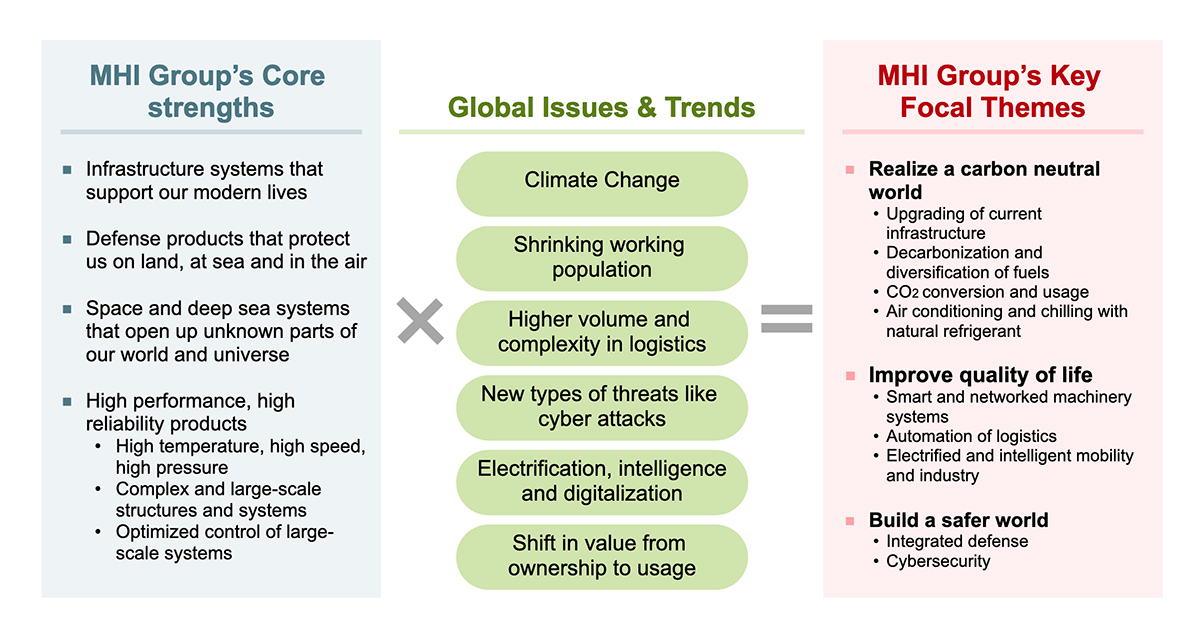Targeting future growth: MHI’s Medium-Term Business Plan explained

Creating a launchpad for future success
Mitsubishi Heavy Industries (MHI) has a long and proud history of contributing to society through the manufacture of a broad range of high-performance, high-quality products and systems that span energy, infrastructure, defense and space. However, many of these businesses have reached maturity, while the needs of society are becoming ever more demanding and diverse.To answer that challenge, MHI’s new Medium-Term Business Plan (MTBP) for 2021-23, is designed to create a launchpad for future success by focusing on carefully selected growth areas, as well as enhancing profitability across the group.
The key, as President and CEO Seiji Izumisawa says will be to: “Integrate cutting-edge technology into expertise built up over many years to provide solutions to some of the world’s most pressing issues and provide better lives.”Specifically, MHI will use its market-leading position in energy systems to help realize a carbon neutral world; it will combine its expertise in mobility and logistics equipment with new technologies, such as digitization and Artificial Intelligence (AI) to improve the quality of life; and it will build a safer society through the continued application of its integrated defense and cybersecurity solutions.

Investing into growth areas
The first step, however, must be to restore profitability. To that end, management is already reducing fixed costs, increasing the ratio of after-sales service and improving the sharing of technology across departments. Together with recovering production volumes, this should enable MHI to reach a business profit margin of 7% in FY2023, with a return on equity of 12%.This, in turn, will secure a strong financial foundation and allow the group to invest 180 billion yen – more than twice as much as in the previous MTBP – into growth areas, with a target of creating 100 billion yen in additional revenues by FY2023 and 1 trillion yen by FY2030.
This growth will come primarily in two areas. The first is MHI’s contribution to achieving a carbon neutral world by 2050. This ‘Energy Transition’ will have to be achieved in stages, starting with the decarbonization of thermal power and the increased use of nuclear power and renewables. Heavy industry and transportation will have to improve their efficiency and reduce emissions. Both the power and industrial sectors will need to capture, recover and recycle increasing amounts of CO2.
Finally, the world needs to switch to green fuels such as ammonia and hydrogen. For these it must establish a comprehensive value chain, from building production facilities and transportation infrastructure to creating sufficient final demand. MHI has the products, technology and expertise to assist producers, utilities and end users during all of these stages.
"The key will be to integrate cutting-edge technology into expertise built up over many years to provide solutions to some of the world’s most pressing issues and provide better lives.”Seiji IzumisawaPresident and CEO, Mitsubishi Heavy Industries
The second source of growth will come from the group combining the know-how of its existing domains of Logistics, Thermal & Drive Systems and Plant & Infrastructure Systems in a more intelligent way. By taking the products already being manufactured by these domains and developing them into interconnected systems through the increased use of digitalization and AI, MHI will be able to provide new value-added solutions to customers.
One example of such a ‘New Mobility and Logistics’ solution is an end-to-end ‘cold chain’ system that uses an automated warehouse, autonomous forklift trucks, natural refrigerant chillers and an AI-based management system to ensure the secure and efficient delivery of chilled foods and medicines (such as the new coronavirus vaccines) from warehouse to supermarket or hospital. Where the group lacks the necessary expertise to develop such solutions, it will collaborate with external partners, such as academic institutions. As President Izumisawa says, MHI is determined to do whatever it takes to make the 2021-23 MTBP a success.
Read how MHI Group will tackle society’s increasingly demanding needs Medium-Term Business Plan for 2021-23





